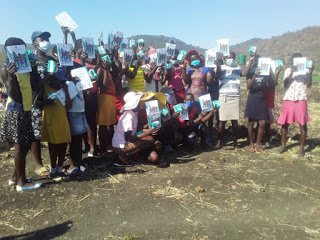Kimberly
Kusauka
Centre for Gender and Community Development in
Zimbabwe in partnership with Vasikana Project recently donated sanitary pads
and menstrual hygiene text books to Mbetu villagers in rural Masvingo.
The event, which was hosted at a vegetable garden in
Mbetu village under Chief Charumbira, saw young women and girls receiving
menstrual health books made especially for those who find it difficult to get
menstrual health advice from their parents or guardians.
CGCDZ projects manager Chida Mudadi said they
collaborated with Vasikana because they are all gender based organizations who
focus on women and girls.
“We collaborated with Vasikana because we are
all gender based organizations and we focus with women.
“We wish to continue working with Vasikana so
that we empower young girls and women on Menstrual Health Management,”
said Chida.
Speaking at the event Vasikana project Director
Honesty Mamutse said he chose the rural community because they are the ones
that are underprivileged, with no income generating projects.
“We chose the rural communities because they
are the ones that are underprivileged and there are no income generating
projects in rural areas.
“We want to empower girls so that they are
aware of their bodies and their rights to make sure that they will not get
married without their consent,” said Mamutse.
One of the beneficiaries Ngonidzashe Ponde said the
donated pads will help her a lot as she is not given money for sanitary wear by
their parents since pads are very expensive and they end up using cloths which
give them infections sometimes.
“We are very fortunate that we were given
sanitary pads which our parents cannot afford in the rural areas,” said
Ponde.
A teacher from Mafuga Primary School Karai Makoho
said the book is very useful since it imparts knowledge that the girls were not
getting from their parents.
“These books are going to be very useful in
imparting knowledge to young girls of Mbetu village since their parents are not
teaching them on how to handle menstruation and I urge girls to share the
information with their mates,” said Makoho.
Constance Njerenje, a young woman from the area
however raised her concern about lack of concern by parents on menstrual health
issues because the cost of living is too high.
“As
young parents we cannot afford to buy sanitary pads for ourselves and our young
girls because they are expensive, so we prioritize buying sugar instead of
sanitary pads.
“We also urge Vasikana project to also donate
panties for our young girls since they do not have anywhere to put their
pads,” said Njerenje.
Vasikana project
started in 2014 and is aimed at empowering girls by providing puberty education
and safe dignified ways for young girls to manage their periods.

